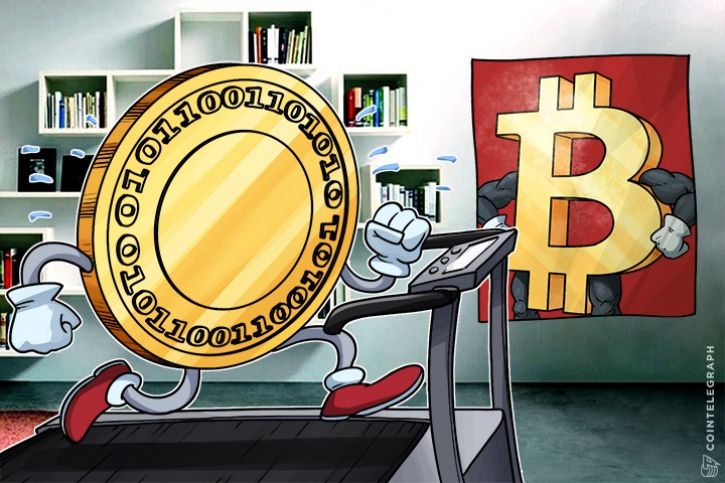
The new cryptocurrency gold rush: digital tokens that raise millions in minutes
New York City
About a dozen rain-soaked people were crammed between the revolving doors and security barriers in the lobby of New York University’s Stern School of Business as torrents pelted down outside. All desperately wanted in to the hottest ticket in town, one that promised to make some of them overnight millionaires, if not billionaires. Among them was Dan Morehead, a former Wall Street titan turned bitcoin investor, and a dentist working on a blockchain startup who had flown in from Seoul.
“I don’t really care that you overbooked, it’s not my problem! I don’t care about a refund,” one agitated man seeking entry barked at two T-shirt clad twentysomethings on the other side, one of them clutching a clipboard.
“You can be upset and raise your voice, but we can’t change anything,” one of the gatekeepers replied.
“We have three clients down there!” another man interjected.
The clipboard holder dutifully scribbled down names. When it was my turn, she said NYU wanted to clear out the huddled mass blocking the building’s entrance: “The auditorium holds like 470 people. We have more than 500 people down there right now. NYU is calling security.”
Inside, a conference called “Token Summit” was in full swing. The event was the first to focus on a rapidly snowballing phenomenon called cryptocurrency token offerings—a new fundraising method that allows companies to raise millions of dollars in mere minutes.
The cryptocurrency world has gone mad for token offerings. These launches, popularly known as ICOs or initial coin offerings, have already raised more than $150 million this year, according to research firm Smith + Crown. They are seen as a disruptive new mechanism that could displace traditional venture capitalists from the fund raising process—a view that’s been endorsed by a coterie of brand name VCs themselves—and remake the internet’s business model with decentralized applications and cryptocurrencies. Take an outfit known as Gnosis, a decentralized prediction market, which raised $12 million in under 15 minutes, valuing it at $300 million. Investors had invested based solely on a PDF prepared by its founders (recently a firm called Brave raised $35 million in 30 seconds).
As cryptocurrency prices exploded, ICO fever gripped the over 2,700 blockchain tech enthusiasts who descended on New York in late May for a series of back-to-back industry conferences. Rumors flew about the fortunes being made, as the cryptocurrency ethereum climbed from $127 per unit of ether at the start of the week to $228 by Thursday. The head of an ethereum app development shop was said to hold 6 million ether, meaning he went from being a mere millionaire on Monday to an ether billionaire, holding $1.4 billion worth of the stuff, three days later. “Out of the 2,700 attendees there were at least 500 millionaires, and between zero to five billionaires,” said one longtime observer of the cryptocurrency scene, who wanted to remain anonymous.
Why are tokens a big deal?
The oracles of Silicon Valley say token offerings could reinvent the “freemium” business model of the internet, upending the huge centralized services—think of Facebook or Google—that have emerged. Instead of enticing users with free services, paid for by venture capital, and then eventually turning a profit by showing ads to those users, tokens offer a direct channel for capital to flow between user and the technologist.
The user would pay for a token upfront, providing funds for coders to develop the promised technology. If the technology works as advertised and gains popularity, it should attract more users, thus increasing demand for the token offered at the start. As the token value increases, those early users who bought tokens will benefit from appreciating token prices. Each token offering has different rules around the total supply of tokens and when they are released.
“This is a ‘better-than-free’ business model, where users make money for being early adopters,” write Balaji Srinivasan and Naval Ravikant, a partner at venture firm Andreessen Horowitz and the founder of investing platform AngelList, respectively. Ravikant has launched a platform called CoinList that will help accredited investors put money into token launches.
Token offerings could also correct an imbalance in the way financial rewards are distributed among technologists. Historically, the people who develop foundational technologies, such as protocols, have watched from the sidelines as others—firms that build the applications running atop those protocols—reap the riches. The Google search engine, for instance, is an application that trawls the world wide web, which is made up of a collection of open-source protocols. Yet it’s Google’s founders who are billionaires and not Tim Berners-Lee, who came up with the protocols that made not just Google, but the entire web, possible.
Cryptotokens could change that because protocol creators now have a way to be rewarded for the success of their technology, without having to create a hit application on top of it. “With tokens … the creators of a protocol can ‘monetize’ it directly and will in fact benefit more as others build businesses on top of that protocol,” writes Albert Wenger, a partner at Union Square Ventures.
This is the argument behind the “fat protocol” investment thesis: the protocols of the past were “thin” and unable to accrue financial value. The application layer resting atop those protocols were the ones to reap the rewards. But cryptotokens could enable the protocols of today to become “fat”—creating more wealth and value than even the enormously successful applications of the past. “These new ‘fat protocols’ may eventually create and capture more value than the last generation of Internet companies,” Srinivasan and Ravikant write.
Venture firms who subscribe to this theory have wasted no time putting their money where their mouths are. This is why firms like Union Square Ventures and Andreessen Horowitz have backed funds like Polychain Capital, which invest exclusively in token offerings. While the tokens are being raised for digital services at the moment—things like storage, identity management, or chat room stickers—one can imagine them being used for offline products and services someday in the future, too.
Nor are tokens limited to new projects. The chat platform Kik, with 15 million monthly active users, launched its own token last week at the conference, in the hopes of seeding an “economy built around chat (pdf).” In practice this means Kik users can earn and spend on special stickers, images, or even entry to celebrity chat rooms using the chat app’s Kin token. Unlike traditional loyalty points issued by a merchant, however, the Kin tokens are decentralized because they are issued on top of ethereum (more on that below). The Kin digital currency could exist even if the chat app vanished after issuance—although it probably wouldn’t be used very much and would be worth little.
What are tokens, exactly?
At this stage, an explainer on what tokens are, exactly, is helpful. You can think of a token offering as a hybrid between a Kickstarter campaign and a stock market flotation. On one hand, the launch lets customers reserve a product or service before it’s completed and ready for the market—that’s the Kickstarter part. On the other hand, it also gives those customers a stake in the future of that product or service; if the service gains in popularity, the token should rise in price, enriching the original users, making it a lot like getting in on a hot IPO. However, one of those analogies puts token issuers squarely in the sights of securities regulators, so the distinction is crucial. More on that later when we discuss the legal gray area that tokens occupy.
Like the rest of the cryptocurrency industry, token offerings rely on a basic circular logic: A token has as much value as its users bestow on it, just as bitcoin rises in price so long as demand outstrips supply. But token boosters say their units of digital currency are different from bitcoin in one critical respect: they are programmable, and have been coded to perform various useful functions.
Tokens issued today are built atop ethereum, the second most valuable cryptocurrency on the market. Ethereum is like bitcoin because it is a tradable digital currency, which is called ether. It’s unlike bitcoin because it was designed with its own programming language—a significant departure from, and its creators say, an upgrade over, bitcoin. This language allows people to write “smart contracts” or automatically executed agreements on ethereum. A bond, for instance, might automatically pay out its coupon, without the need for an intermediary or paperwork.
It turns out that ethereum’s programming language is powerful enough that coders can write smart contracts that issue new units of digital currency, bound by their own rules. This is what the tokens offered today are: a series of complicated ethereum smart contracts. The ethereum network itself is being used as a giant token-issuing machine. “Right now ethereum is a token factory,” says Muneeb Ali, co-founder of Blockstack, a startup working on building tools for a decentralized internet.
The circularity of cryptocurrency economics is at play again here: Ethereum itself raised capital from its users by offering ether tokens in 2014, raising $18 million. The ethereum protocol then became a staging ground for experiments in token funding: A vehicle called the Decentralized Autonomous Organization managed to raise $150 million on the promise that it would be a new form of business structure, one that automated away managers using a combination of smart contracts and tokens. It was promptly hacked for millions and flamed out spectacularly.
An ethereum-based token is to ether as a concert ticket is to a US dollar, Peter Van Valkenburgh, director of research at the Coin Center think tank, suggests. “In the real world we often use all sorts of items rather like we use cash,” he writes. “We use tickets, coupons … and a variety of bearer instruments because they entitle the holder to different things.” These customized tokens can be traded on secondary markets, like exchanges, and have their own value, independent of the price of ether.
Orange groves and securities law
While the potential of token launches remains vague, though powerful, almost everyone I spoke to at the New York conferences agreed on one thing: The US government would crack down on the offerings eventually. No one seems to think the good times for ICOs will last.
The legality of tokens hinges on something called the “Howey test,” named after a Florida company in the 1940s that tried to raise capital by selling contracts against its citrus groves—a practice that the US Supreme Court ruled was similar to a stock offering. At the Consensus conference, the debate about whether or not ICOs were like citrus grove contracts was captured by an exchange between Van Valkenburg, who argued that tokens are like products and not securities, and Preston Bryne, a lawyer and founder of a blockchain company called Monax.
“It’s like buying gold … it’s not like buying a security in a gold mine,” said Van Valkenburg. Responded Bryne, “This is complete nonsense. Everybody knows what this is. It’s, in substance and form, the sale of investments that people are purchasing with expectation of profit at a later date.”
Of course, what really matters is the regulator’s opinion. The US Securities and Exchange Commission hasn’t weighed in on the matter yet. But an SEC official who spoke at the Consensus conference, Valerie Szczepanik, who heads its unit looking at blockchain tech, sounded a note of caution, according to Reuters: “Whether or not you are regulated by the SEC, you still have fiduciary duties to your investors. If you want this industry to flourish, protection of investors should be at the forefront.”
Token boosters await official intervention with a mixture of trepidation and relief. Take Stan Miroshnik, who was a veteran investment banker with Morgan Stanley in London. He now runs a firm called Argon that corrals big investors—like cryptocurrency “whales,” adventurous family offices, and hedge funds—into token launches to ensure they’re sold out.
When a group of coders wants to raise money for their project, Miroshnik hits Slack teams, Telegram groups, and gets press in the cryptocurrency trade media to rustle up business. “Having seen the technology boom in the 90s, this is just another emerging capital market,” he says. “It needs institutional grade providers like ourselves who come out of traditional investment banks. One day Fidelity is going to show up and say, ‘I want $4 billion of that token, help me buy it.’ You need someone who can, frankly, speak their language.”
For Miroshnik, the sooner the SEC steps in, the better. “I welcome it,” he says. “It would be helpful to figure out where the boundaries are.”
WRITTEN BY
Joon Ian Wong
David Ogden
Entrepreneur
Alan Zibluk Markethive Founding Member









